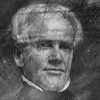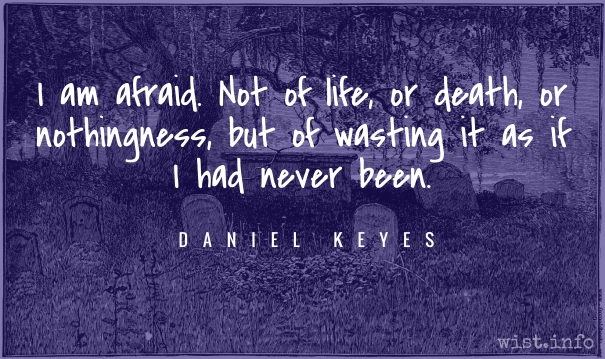It’s but little good you’ll do a-watering the last year’s crop.
George Eliot (1819-1880) English novelist [pseud. of Mary Ann Evans]
Adam Bede, ch. 18 [Mrs. Poyser] (1859)
(Source)
Quotations about:
futility
Note not all quotations have been tagged, so Search may find additional quotes on this topic.
It is worse than useless to try to put down by law a practice which a very large number of people believes to be innocent, and which must be left to the taste and conscience of the individual.
William Ralph Inge (1860-1954) English prelate [Dean Inge]
“The Birth-Rate” (1917), Outspoken Essays: First Series (1919)
(Source)
Speaking of birth control.
BOB: No matter how many times you save the world, it always manages to get back in jeopardy again. Sometimes I just want it to stay saved! You know?! For a little bit. I feel like the maid: “I just cleaned up this mess! Can we keep it clean for, for 10 minutes?! Please?!”
A teacher who is attempting to teach without inspiring the pupil with a desire to learn is hammering cold iron.
Horace Mann (1796-1859) American educator
(Attributed)
Quoted in The Eclectic Magazine, Vol. 8 (Jan-Jun 1868), and in The Myrtle, Vol. 24, #40 (30 Jan 1875)
The probability that we may fall in the struggle ought not deter us from the support of a cause we believe to be just; it shall not deter me.
The gods had condemned Sisyphus to ceaselessly rolling a rock to the top of a mountain, whence the stone would fall back of its own weight. They had thought with some reason that there is no more dreadful punishment than futile and hopeless labor.
Albert Camus (1913-1960) Algerian-French novelist, essayist, playwright
“The Myth of Sisyphus”, The Myth of Sisyphus (1942)
(Source)
O poor mortals, how ye make this Earth bitter for each other; this fearful and wonderful Life fearful and horrible; and Satan has his place in all hearts! Such agonies and ragings and wailings ye have, and have had, in all times: — to be buried all, in so deep silence; and the salt sea is not swoln with your tears.
Thomas Carlyle (1795-1881) Scottish essayist and historian
The French Revolution: A History, Part 1, Book 5, ch. 5 (1.5.5) (1837)
(Source)
As the prospect of violence mounts within Paris on the night of 13 July 1789. The next day was the storming of the Bastille.
MACBETH: To-morrow, and to-morrow, and to-morrow,
Creeps in this petty pace from day to day
To the last syllable of recorded time,
And all our yesterdays have lighted fools
The way to dusty death. Out, out, brief candle!
Life’s but a walking shadow, a poor player
That struts and frets his hour upon the stage
And then is heard no more: it is a tale
Told by an idiot, full of sound and fury,
Signifying nothing.William Shakespeare (1564-1616) English dramatist and poet
Macbeth, Act 5, sc. 5, l. 22ff (5.5.22-31) (1606)
(Source)
I may have the gift of inspired preaching; I may have all knowledge and understand all secrets; I may have all the faith needed to move mountains — but if I have no love, I am nothing.
The Bible (The New Testament) (AD 1st - 2nd C) Christian sacred scripture
1 Corinthians 13:2 [GNT (1976)]
(Source)
Alternate translations:And though I have the gift of prophecy, and understand all mysteries, and all knowledge; and though I have all faith, so that I could remove mountains, and have not charity, I am nothing.
[KJV (1611)]If I have the gift of prophecy, understanding all the mysteries there are, and knowing everything, and if I have faith in all its fulness, to move mountains, but without love, then I am nothing at all.
[JB (1966)]And though I have the power of prophecy, to penetrate all mysteries and knowledge, and though I have all the faith necessary to move mountains -- if I am without love, I am nothing.
[NJB (1985)]If I have the gift of prophecy and I know all the mysteries and everything else, and if I have such complete faith that I can move mountains but I don’t have love, I’m nothing.
[CEB (2011)]And if I have prophetic powers and understand all mysteries and all knowledge and if I have all faith so as to remove mountains but do not have love, I am nothing.
[NRSV (2021 ed.)]
To argue with a man who has renounced the use and authority of reason, and whose philosophy consists in holding humanity in contempt, is like administering medicine to the dead, or endeavoring to convert an Atheist by scripture.
Thomas Paine (1737-1809) American political philosopher and writer
The American Crisis #5, “To General Sir William Howe” (23 Mar 1778)
(Source)
Sometimes shortened as: "To argue with a man who has renounced his reason is like giving medicine to the dead."















